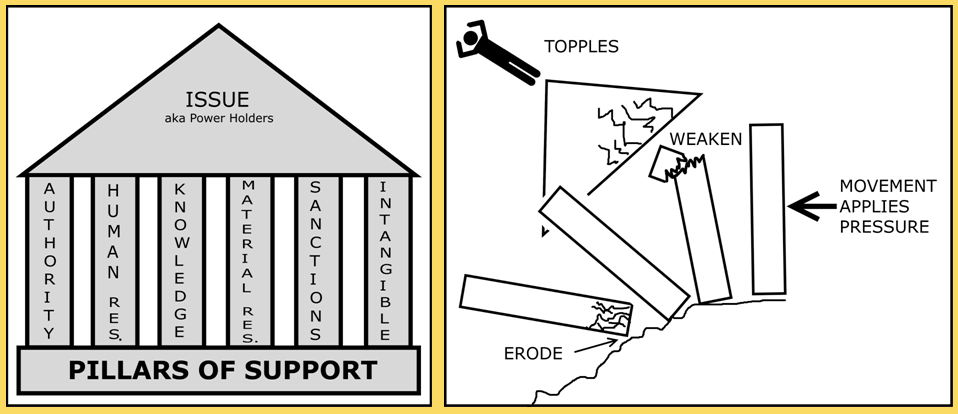Greetings friends and creators of beloved community,
Click HERE to view the video.
Thank you for your participation and attentiveness during our second session of Nonviolence and Social Change. Below is a summary recap of the second session and a small homework assignment. Invite your friends to join us. Anyone can still register (click HERE) and will have access to the video recordings. Also thank you for your donations. The content of this page includes:
Homework
Beloved Community
Six Principles of Nonviolence
Six Steps of Nonviolent Social Change
Pillars of Support
Resources
Bonus Material
Session 1 | Session 2 | Session 3 | Session 4
HOMEWORK
Watch The success of nonviolent civil resistance: Erica Chenoweth at TEDxBoulder
Click HERE to watch YouTube video
Watch Erica Chenoweth discuss the empirical evidence of nonviolent campaigns
Click HERE to watch YouTube video
Continue journaling about what does “beloved community” mean to you. We will have opportunities for some of you to share your writings. (sample below)
BELOVED COMMUNITY
This is a sample of one person’s reflection on “What does beloved community mean to you?”
My engagement in the world is fueled by a vision of beloved community. A society who appreciates that people possess an abundance of creativity, talent, initiative, energy, and resourcefulness to serve the greater good. A village that energizes and mobilizes the creative and intellectual resources of all people at all levels of the community; where each of us communicates peoples’ worth and potential so clearly that they come to see it in themselves. A place where neighbors join together, in contemplation and action, to focus on purpose, teach principles, seek peace, and protect dignity; where we embrace one another and honor opportunities to experience the fullness of life, to have life abundantly, and to discover the miracles of love. May this be our shared vision; a beloved community committed to creating meaningful lives in loving presence with the whole of human civilization.
SIX PRINCIPLES OF NONVIOLENCE
Fundamental tenets of Dr. King’s philosophy of nonviolence described in his first book, Stride Toward Freedom. The six principles include:
PRINCIPLE ONE: Nonviolence Is a Way of Life for Courageous People.
- It is not a method for cowards; it does resist.
- It is active nonviolent resistance to evil (including evil in response to evil).
- It is assertive spiritually, mentally, and emotionally.
PRINCIPLE TWO: Nonviolence Seeks to Win Friendship and Understanding.
- The outcome of nonviolence is the creation of the Beloved Community.
- The end result of nonviolence is redemption and reconciliation
- (keeps the ultimate goal of the Beloved Community in mind)
PRINCIPLE THREE: Nonviolence Seeks to Defeat Injustice, or Evil, Not People.
- Nonviolence recognizes that evildoers are also victims and are not evil people.
- The nonviolent resister seeks to defeat evil not persons victimized by evil.
- (leaves the door open for reconciliation)
PRINCIPLE FOUR: Nonviolence Holds That Unearned, Voluntary Suffering for a Just Cause Can Educate and Transform People and Societies.
- Nonviolence is a willingness to accept suffering without retaliation; to accept blows without striking back.
- Nonviolence is a willingness to accept violence if necessary but never inflict it.
- Nonviolence holds that unearned suffering for a cause is redemptive and has tremendous educational and transforming possibilities.
- (yields transforming power of sacrifice)
PRINCIPLE FIVE: Nonviolence Chooses Love Instead of Hate.
- Nonviolence resists violence of the spirit as well as the body.
- Nonviolent love is spontaneous, unselfish, and creative.
- (Love—fuel for the Beloved Community and for reconciliation- is the foundation of nonviolence)
PRINCIPLE SIX: Nonviolence Believes That the Universe Is on the Side of Justice.
- The nonviolent resister has deep faith that justice will eventually win.
- Nonviolence believes that God is a God of justice.
- (“Justice at its best is love correcting everything that stands against love” — Reconciliation is possible)
SIX STEPS OF NONVIOLENT SOCIAL CHANGE
The Six Steps for Nonviolent Social Change are based on Dr. King’s nonviolent campaigns and teachings that emphasize love in action. Dr. King’s philosophy of nonviolence, as reviewed in the Six Principles of Nonviolence, guide these steps for social and interpersonal change.
INFORMATION GATHERING: To understand and articulate an issue, problem or injustice facing a person, community, or institution you must do research. You must investigate and gather all vital information from all sides of the argument or issue so as to increase your understanding of the problem. You must become an expert on your opponent’s position.
EDUCATION: It is essential to inform others, including your opposition, about your issue. This minimizes misunderstandings and gains you support and sympathy.
PERSONAL COMMITMENT: Daily check and affirm your faith in the philosophy and methods of nonviolence. Eliminate hidden motives and prepare yourself to accept suffering, if necessary, in your work for justice.
DISCUSSION/NEGOTIATION: Using grace, humor and intelligence, confront the other party with a list of injustices and a plan for addressing and resolving these injustices. Look for what is positive in every action and statement the opposition makes. Do not seek to humiliate the opponent but to call forth the good in the opponent.
DIRECT ACTION: These are actions taken when the opponent is unwilling to enter into, or remain in, discussion/negotiation. These actions impose a “creative tension” into the conflict, supplying moral pressure on your opponent to work with you in resolving the injustice.
RECONCILIATION: Nonviolence seeks friendship and understanding with the opponent. Nonviolence does not seek to defeat the opponent. Nonviolence is directed against evil systems, forces, oppressive policies, unjust acts, but not against persons. Through reasoned compromise, both sides resolve the injustice with a plan of action. Each act of reconciliation is one step closer to the ‘Beloved Community.’
PILLARS OF SUPPORT
RESOURCES
Dr. King’s Fundamental Philosophy of Nonviolence
Six Principles and Six Steps
https://thekingcenter.org/about-tkc/the-king-philosophy/
BONUS
This audio is from another course; Robert speaks about the Contemplative Foundation of Nonviolence:
Audio Player


